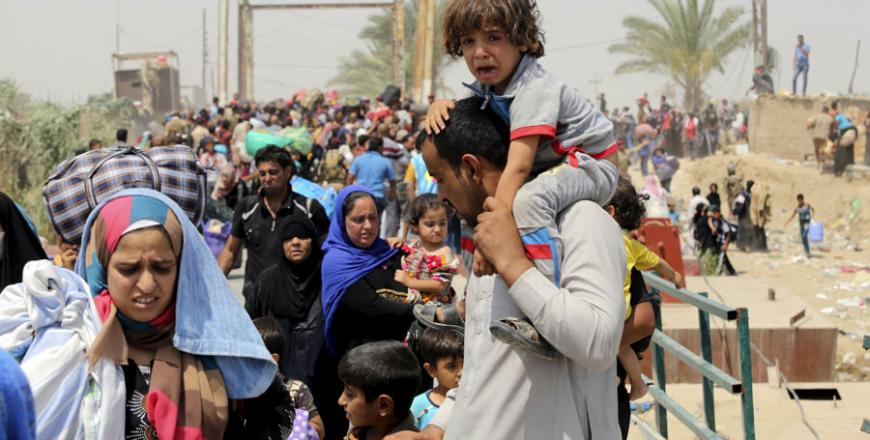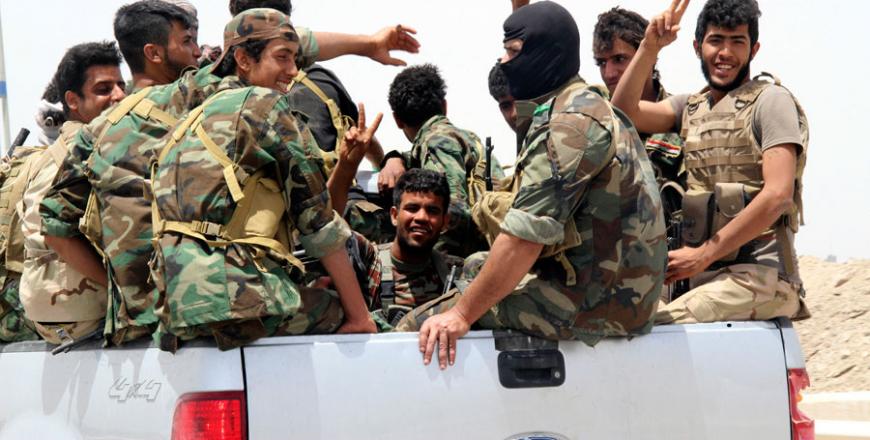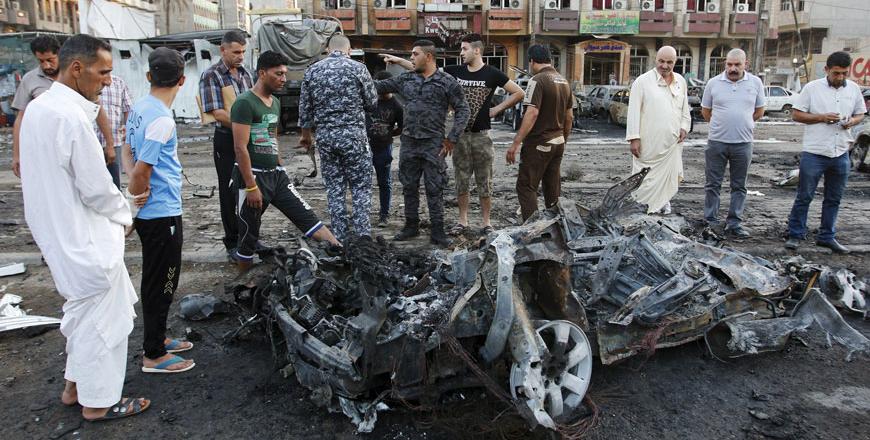You are here
US defence chief’s criticism of Iraqis raises questions
By AP - May 25,2015 - Last updated at May 25,2015

A displaced Sunni man fleeing the violence in Ramadi carries a crying child on his shoulders, on the outskirts of Baghdad, on Sunday (Reuters photo)
WASHINGTON — The Daesh group’s takeover of the Iraqi provincial capital Ramadi has prompted criticism from Defence Secretary Ash Carter and raised new questions about the Obama administration’s strategy to defeat the extremist group.
The Daesh group, which had already seized a strategically important swath of the Middle East, seized Ramadi in central Iraq a week ago, which has revived concerns about US efforts to fight the group.
The Obama administration’s approach in Iraq is a blend of retraining and rebuilding the Iraqi army, prodding the Shiite-dominated government in Baghdad to reconcile with the nation’s Sunnis and bombing Daesh group targets from the air without committing American ground combat troops.
President Barack Obama’s strategy is predicated on Baghdad granting political concessions to the country’s alienated Sunnis, who are a source of personnel and money for the Daesh group. But there has been little visible progress on that front. Baghdad has continued to work closely with Shiite militias backed by Iran, which have been accused of atrocities against Sunnis, a religious minority in Iraq that ruled until Saddam Hussein fell from power.
The US has sought to reach out on its own to Sunni tribes and is training some Sunni fighters, but those efforts have been limited by the small number of American troops on the ground.
Carter said in an interview aired Sunday that Shiite-led Iraqi forces did not show a “will to fight” in the battle for Ramadi, a Sunni city.
Although Iraqi soldiers “vastly outnumbered” their opposition in the capital of Anbar province, they quickly withdrew a week ago without putting up much resistance from the city in Iraq’s Sunni heartland, Carter said on CNN’s “State of the Union”.
The Iraqis left behind large numbers of US-supplied vehicles, including several tanks, now presumed to be in Daesh hands.
“What apparently happened is the Iraqi forces just showed no will to fight,” Carter said. “They were not outnumbered; in fact, they vastly outnumbered the opposing force. That says to me, and I think to most of us, that we have an issue with the will of the Iraqis to fight ISIL and defend themselves.”
The White House declined to comment on Sunday.
A spokesman for the Iraqi government said Monday that Carter’s remarks were surprising and that the US defence chief had been given “incorrect information”. In a statement, Saad Al Hadithi said the fall of Ramadi was due to mismanagement and poor planning by some senior military commanders in charge of Ramadi.
Iraqi lawmaker Hakim Al Zamili, the head of the parliamentary defence and security committee, called Carter’s comments “unrealistic and baseless”, in an interview with The Associated Press.
“The Iraqi army and police did have the will to fight IS group in Ramadi, but these forces lack good equipment, weapons and aerial support,” said Al Zamili, a member of the political party headed by radical Shia cleric Moqtada Al Sadr, who is stridently anti-American.
American officials say they are sending anti-tank weapons to the Iraqi military. But they also noted that Iraqi forces were not routed from Ramadi — they left of their own accord, frightened in part by a powerful wave of Daesh group suicide truck bombs, some the size of the one that destroyed the federal building in Oklahoma City two decades ago, said a senior State Department official who spoke to reporters last week under ground rules he not be named.
A senior defence official said that the troops who fled Ramadi had not been trained by the US or its coalition partners. The official was not authorised to address the matter publicly and spoke on condition of anonymity.
Carter defended the use of US air strikes, but he said they are not a replacement for Iraqi ground forces willing to defend their country.
American intelligence officials have assessed for some time that Iraq is unlikely ever again to function as the multi-ethnic nation-state it once was, and that any future political arrangement would have to grant significant local autonomy to the three main groups — Sunnis, Shiites and Kurds. But the Obama administration has continued to pursue a “one Iraq” policy, routing all assistance through Baghdad.
Over the past year defeated Iraq security forces have repeatedly left US-supplied military equipment on the battlefield, which the US has targeted in subsequent air strikes against Daesh forces. The Pentagon this past week estimated that when Iraqi troops abandoned Ramadi, they left behind a half-dozen tanks, a similar number of artillery pieces, a larger number of armoured personnel carriers and about 100 wheeled vehicles like Humvees.
Related Articles
BAGHDAD — Iraq on Tuesday announced the launch of a major military operation to drive Daesh from the western Anbar province and retake the S
BAGHDAD — Iraq has for the first time deployed troops trained by the US-led coalition in their campaign to retake the city of Ramadi from Da
WASHINGTON — A summer of stalemate in the effort to reclaim the Iraqi provincial capital of Ramadi, despite US-backed Iraqi troops vastly ou













